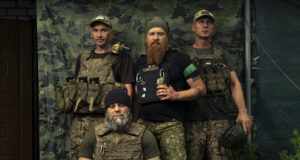It’s 1994 and Robert D. Kaplan is in China’s Xinjiang Province, home to 11 million Turkic Uyghur Muslims whom the world now knows as the Uyghurs. He soon learns they are “trapped in a grip of surveillance and brutal repression by the Chinese authorities”. To the Uyghurs, as well as to “geographers and ethnographers, this western outpost of China was historically East Turkestan”, he writes.
The Loom of Time is Robert’s Kaplan latest, characteristically magisterial book, and this opening anecdote holds the key to his enduring importance. He goes on to describe how back in the mid-Nineties an editor had described his interest in the Uyghurs as “testing the limits of obscurantism”. But Kaplan knew different — especially since he understood, when he went again in 2015, that the backdrop for this repression was China’s $1 trillion Belt and Road Initiative: “a postmodern transportation network of highways, railways, and energy pipelines linking China by land and sea with Europe across the Greater Middle East”.
Kaplan’s thinking is grounded in geography. Whether it is how the state of Iraq is so geographically incoherent that its descent into chaos was almost inevitable or the conservative influence of mountains on society, the truth is always to be found not in textbooks or the corridors of government, but out in the field, traversing the veins and capillaries that comprise our world: the alleyways and the slums and the bogs — the terrain.
His trip to Xinjiang illustrates his process in miniature. One, understand the map; two, get to the places that others won’t go; and three, from there, better understand the human activities (such as the Belt and Road) that act upon it. This is the beginning of political knowledge.
The book is about the Greater Middle East, loosely speaking the Islamic world “stretching from Morocco in the western Mediterranean to East Turkestan, abutting the arable cradle of China”. A region that absolutely cannot be understood without knowledge of its desert and plains and mountains and bazaars, and without its perennial curse: foreign meddling.
Historically, this has taken the form of avowed empires, which in their 19th-century Western form at least, are dead. Kaplan correctly observes that “in a globalised world one culture cannot simply appropriate and subjugate other cultures for its own ends”. Empires are now not only morally wrong but déclassé.
The imperial mindset, though, persists. If the Greater Middle East was once in the sights of the imperial West — whose afterlife continued with “humanitarian interventions” of Afghanistan and Iraq — it is now the fight zone for what Kaplan calls “ghost empires”: China, which seeks to link its budding commercial outposts in Europe with those in East Asia; but also Turkey and Iran, two former empires which also revere their imperial pasts. As Kaplan observes: “Western imperialism may be looked down upon, but not so the record of indigenous empires.”
Where once the British East India Company advanced eastward from Europe across the Middle East to China, China now advances westward, with similar commercial and strategic motives. It has built a large military base in Djibouti at the mouth of the Red Sea, and is contemplating others further north along the Red Sea at Port Sudan and at Jiwani by the Pakistan-Iran border near Gwadar. It is indeed “a great age in history to be a Chinese civil engineer”.
Geography for Kaplan also serves a wider purpose: it both informs and explains a particular view of history — the long view. What Fernand Braudel, the mid-20th-century French geographer and historian of the Mediterranean, calls la longue durée. If geography is, more or less, immutable, its effects on history are most apparent when you consider it not over months or years, as we have a tendency to do, but over centuries and even millennia. Like Braudel, Kaplan is interested in “the slow, imperceptible changes, like the sluggish movements of the ocean at its deepest depths, which invisibly determine the fast-moving, transitory ripples at the surface, upon which the media remain focused”.
Taking the long view of history frees you from the varying conceptual and ideological preoccupations of differing periods. And being immutable, geography does not yield to ideology. This means you can start to look at monarchy and empire and autocracy and even democracy — which “according to the long arc of time, remains but a bold experiment” in the Greater Middle East — not exclusively in terms of their morality but their efficacy.
It is an unfashionable approach, but unlike the ad hominem polemics of the column or tweet thread, it shows genuine intellectual bravery. Kaplan writes: “Thus, to define the Arab world in particular as a contest between democracy and authoritarianism — as so many people do — is to impose simulated categories upon it, specific to America’s own historical experience, not to the historical experience of the region in question.” This tendency to view the world as an extension of the United States is simple, and simplistic. Go to a region and decide: who are the victims? Who are the oppressors? Who is black, who is white? Often, the categories are not only irrelevant but unhelpful, and even dangerous. And there is a name for this: imperialism, albeit of the cultural kind.
This is also, in the end, a deeply moral approach, because, as we saw in Iraq, what does not work in the Greater Middle East almost always ends in horror. This is a book about the region, but it is also a book about our reaction to it, which has in turn helped to mould it. Kaplan understands how disastrous this reaction has been, not least through the importation of the “fatal idea” of modern nationalism that, among other things, brought genocide to communities of Turks, Greeks and Armenians who had once coexisted under the Ottoman Empire. This is a place where “the assault of the West, from urbanisation to imperialism to modern nationalism to weapons technology, created complex and hybrid cultural orders throughout the developing world, where chaos took on a magnified and deadly quality”.
This is the binary that has so obsessed Kaplan throughout his career: the dialectic between chaos and order. In February 1994, he wrote a now-famous piece in The Atlantic called “The Coming Anarchy”. While think-tankers and politicians pondered the role democracy would play in the coming years, Kaplan, out in the field, argued that it was tribal and ethnic divides, dwindling resources, and desertification and drought — which is to say climate change — that would shape the future.
He was right. In 2023, it’s not Cold War fears of nuclear Armageddon or industrialised state war that loom but the spectre of anarchy. The conflict in Ukraine wasn’t officially a war when it began, often fought by local “separatists” — Russian proxies — and with mercenaries and organised criminal gangs all seeking a piece of the action. Meanwhile, opposing combatants often share a “nationality” sundered by ethnicity and language, while foreign fighters flow in on both sides. Head south and see conflict washing across the Sahel as Jihadists groups exploit the desperation wrought by dwindling water and exploding populations. We are living in Robert Kaplan’s world, not the value-freighted one that existed only in the imaginations of Tony Blair and Barack Obama.
Towards the end of the book, Kaplan quotes from War and Peace. Count Rostopchin, a general and statesman, “had known for a long time that Moscow would be abandoned, but had known it only with his reason, while with all his soul he had not believed it”. The homily here is a simple one. Rostopchin knew Moscow would fall to Napoleon, but he could not bring himself to believe it so, when it happened, he was helpless to act.
The prerequisite to effective action is to first accept reality as it is — not in the lecture room or government department, but on the ground. This is the leitmotif that runs throughout Kaplan’s work. It is what has kept him at the cutting edge of geopolitical thought for decades, and it is what we must internalise, or else we will continue to act ineffectively, or worse, with great harm.
Disclaimer
Some of the posts we share are controversial and we do not necessarily agree with them in the whole extend. Sometimes we agree with the content or part of it but we do not agree with the narration or language. Nevertheless we find them somehow interesting, valuable and/or informative or we share them, because we strongly believe in freedom of speech, free press and journalism. We strongly encourage you to have a critical approach to all the content, do your own research and analysis to build your own opinion.
We would be glad to have your feedback.
Source: UnHerd Read the original article here: https://unherd.com/



